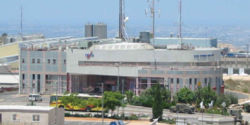Barkan (Hebrew: בַּרְקָן) is an Israeli settlement in the northern West Bank, about 8 km west of the Palestinian city of Salfit, under the administrative local government of the Shomron Regional Council. In 2022 its population was 2,040.
Barkan
בַּרְקָן | |
|---|---|
 The Barkan mall | |
| Coordinates: 32°6′27″N 35°6′20.51″E / 32.10750°N 35.1056972°E | |
| District | Judea and Samaria Area |
| Council | Shomron |
| Region | West Bank |
| Affiliation | Mishkei Herut Beitar |
| Founded | 1981 |
| Founded by | Beitar and Herut |
| Population (2022)[1] | 2,040 |
The international community considers Israeli settlements in the West Bank illegal under international law, but the Israeli government disputes this.[2]
History
editFounded in June 1981 by secular Israelis from the Beitar and Herut movements, Barkan is part of a chain of settlements built along the Trans-Samaria Highway, and adjacent to the Barkan Industrial Park. The park, established in 1982, has 120 businesses and factories manufacturing plastics, metal-work, food, textile, and more. Of the 5,000 workers, 90% are Palestinian Arabs.[3]
According to ARIJ, Israel confiscated land from two Palestinian villages in order to construct Barkan: 167 dunams from Qarawat Bani Hassan,[4] and 353 dunams from Sarta.[5]
"Barkan" is called after the Hebrew name of the Syrian thistle. The original name of the town was Beit Abba after Abba Ahimeir, a leader of the Lehi.[6]
Archaeology
editAn archeological site east of the town contains remnants of an Israelite settlement during the time of the first and second temples.
See also
editReferences
edit- ^ "Regional Statistics". Israel Central Bureau of Statistics. Retrieved 21 March 2024.
- ^ "The Geneva Convention". BBC News. 10 December 2009. Retrieved 27 November 2010.
- ^ Barkan Industrial Park
- ^ Qarawat Bani Hassan Town Profile, ARIJ, p. 17
- ^ Sarta Village Profile (including ‘Izbat Abu Adam Locality), p. 18
- ^ Miskin, Maayana (15 July 2011). "After 30 Years: Barkan Honors Achimeir". Israel National News. Retrieved 16 July 2011.
When Barkan was founded 30 years ago it had the name Beit Abba, in honor of Achimeir.
